Misconduct in public office is a common law offence in the United Kingdom that is defined as an individual who, being a public officer, acting in that capacity or under the pretence of such office, wilfully neglects to perform his duty and/or wilfully misconducts himself to such a degree as to amount to an abuse of the public’s trust in the office holder.
This offence carries a maximum sentence of life imprisonment and is considered to be one of the most serious offences that a public official can commit.
Where there is clear evidence of one or more statutory offences, they should usually form the basis of the case, with the ‘public office’ element being put forward as an aggravating factor for sentencing purposes.
The Crown Prosecution Service (CPS) prosecutes criminal cases that have been investigated by the police and other investigative organisations in England and Wales.
What is a Public Officer ?
The prosecution must have evidence to show that the suspect is a ‘public officer’. There is no simple definition and each case must be assessed individually, taking into account the nature of the role, the duties carried out and the level of public trust involved.
The courts have been reluctant to provide a detailed definition of a public officer. The case law contains an element of circularity, in that the cases tend to define a public officer as a person who carries out a public duty or has an office of trust.
It is extremely difficult to extract from the cases any general identifying features of public officers in a contemporary context. A person may fall within the meaning of a ‘public officer’ where one or more of the following characteristics applies to a role or function that they exercise with respect to the public at large:
CPS Misconduct in Public Office
- Judicial or quasi-judicial
- Regulatory
- Punitive
- Coercive
- Investigative
- Representative (of the public at large)
- Responsibility for public funds
Types of Public Office
The following have been accepted as holding a public office by the courts over several centuries:
CPS Misconduct in Public Office
- Coroner (1675) Parker 2 Lev 140
- Constable (1703) Wyatt 1 Salk 380
- Accountant in the office of the Paymaster General (1783) Bembridge 3 Doug
- K.B. 32
- Justice of the Peace (1791) Sainsbury 4 T.R 451
- Executive or ministerial officer (1819) R v Friar 1 Chit.Rep (KB) 702
- Gaoler (1827) Cope 6 A%E 226
- Mayor or burgess (1828) Henly v Mayor of Lyme 5 Bing 91
- Magistrates Pinney (1832) 110 ER 349
- Overseer of the poor (1891) Hall 1 QB 747
- Army officer (1914) Whitaker 10 Cr.App.R.245
- County Court registrar (district judge) (1968) Llewellyn-Jones 1 Q.B.429
- Police officer (1979) Dytham 69 Cr.App.R.387
- Local authority employees (1995) Bowden 4 All E.R 505
- DVLA employees Att Gen’s Ref (No 140 of 2004) [2004] EWCA Crim 3525
- Police Community Support Officer Amar Iqbal [2008] EWCA Crim 2066
- Immigration officers John-Ayo [2009] 1 Cr App R (S) 71
- Those in charge of police computer systems Gallagher [2010] EWCA Crim 3201
- Nurses working within a prison Cosford [2014] QB 81
- Church of England clergy James (1850) 2 Den 1, 169 ER 393 though its authority was doubted in the unreported case of Ball (8 September 2015) in which Wilkie J ruled that a Church of England Bishop was a public office holder.
- Local councillor (2004) R v Speechley [2004] EWCA Crim 3067
- Member of the Independent Monitoring Board for prisons (2010) R v Belton [2010] EWCA Crim 2857
History of Misconduct in Public Office
The offence of misconduct in public office was first recognized by the English courts in the 18th century.
The earliest known case is that of Lord Ferrers in 1760, where he was charged with and found guilty of the murder of his steward, whom he had dismissed. Lord Ferrers was executed for his offence, and his case set the precedent for the use of the offence of misconduct in public office in cases involving abuse of power by public officials.
Elements of Misconduct in Public Office
The offence of misconduct in public office is comprised of three key elements. Firstly, the defendant must be a public officer. This includes anyone who holds public office, regardless of whether they are elected, appointed, or employed by the state.
Secondly, the defendant must have acted in their capacity as a public officer or under the pretence of such office. The courts have held that this element is satisfied if the defendant’s misconduct is in some way connected to their public office, even if it does not involve the direct exercise of their official duties.
Thirdly, the defendant must have wilfully neglected to perform their duty and/or wilfully misconducted themselves to such a degree as to amount to an abuse of the public’s trust in the office holder. The courts have held that wilfulness is an essential ingredient of this offence. This means that the defendant must have intended to neglect their duty or to act in a way that amounts to an abuse of the public’s trust.
Application of Misconduct in Public Office in Case Law
Misconduct in public office has been used in a variety of contexts, including cases involving police officers, politicians, and civil servants.
One high-profile case involving misconduct in public office is that of R v Dytham. In this case, a police officer who failed to intervene when he witnessed a murder was found guilty of this offence.
Another notable case is that of R v Chaytor, where a Member of Parliament who had claimed false expenses was found guilty of this offence.
Modern Significance of Misconduct in Public Office
The offence of misconduct in public office is still relevant in the modern legal system. In 2021, two Metropolitan Police officers were charged with misconduct in public office in connection with the investigation into the disappearance of Sarah Everard. The charges related to allegations that the officers had taken photographs of Ms. Everard’s body and shared them with others.
Misconduct in public office is a serious offence that is used in cases involving public officials who abuse their power. The offence has a long history in the UK legal system, and it remains relevant in modern times. The elements of the offence are well established, and it has been applied in a variety of contexts, including cases involving police officers, politicians, and civil servants. While the offence carries a maximum sentence of life imprisonment, the courts have been careful to ensure that it is only used in cases where the defendant’s conduct is truly egregious and amounts to a serious abuse of the public’s trust.
It is worth noting that the offence of misconduct in public office is not without controversy. Some commentators have argued that the offence is too vague and open-ended, and that it can be used to prosecute individuals for conduct that is not clearly criminal. There have also been concerns that the offence is disproportionately used against public officials, and that it is not used often enough in cases involving private sector individuals who engage in similar conduct.
Despite these criticisms, the offence of misconduct in public office remains an important tool for prosecutors in cases where public officials have abused their power. As with all criminal offences, it is important that the offence is applied in a fair and consistent manner, and that individuals are not prosecuted for conduct that does not clearly amount to an abuse of the public’s trust.
If you are facing allegations of misconduct in public office, it is important to seek legal advice as soon as possible. A qualified criminal defence lawyer can help you to understand the charges against you and develop a strategy for defending yourself in court.
- CPS Guidance on Misconduct in Public Office: https://www.cps.gov.uk/legal-guidance/misconduct-public-office
- R v Dytham: https://www.bailii.org/ew/cases/EWCA/Crim/1979/5.html
- R v Chaytor: https://www.bailii.org/uk/cases/UKSC/2010/52.html
- News of the World phone hacking scandal: https://www.bbc.co.uk/news/uk-14070758
- Sarah Everard case: https://www.bbc.co.uk/news/topics/c8657zxk82wt






The Ministry of Injustice is not the Ministry of Justice nor is it affiliated in any way with the justice system, legal profession or any law enforcement agencies.
Most Popular ↓




What is Policing by Consent ? What is Two Tier Policing ?
Latest Articles ↓
- What is the Forensic Science Regulator ?Forensic science is a cornerstone of modern criminal justice, providing critical evidence that can make or break a case. However, the reliability and accuracy of… Read more: What is the Forensic Science Regulator ?
- What is the Criminal Cases Review Commission ?The Criminal Cases Review Commission (CCRC) stands as a vital institution within the criminal justice system, dedicated to investigating potential miscarriages of justice. Established in… Read more: What is the Criminal Cases Review Commission ?
- Did Bobby Vylan and the BBC break the law at Glastonbury 2025 ?The performance by Bob Vylan at Glastonbury 2025, where frontman Bobby Vylan (reportedly Pascal Robinson-Foster) led chants of “death, death to the IDF” and “from… Read more: Did Bobby Vylan and the BBC break the law at Glastonbury 2025 ?
- Police Public Confidence and EngagementThe Independent Office for Police Conduct (IOPC) undertake regular surveys to assess the public’s perceptions of the police, as well as their confidence in the… Read more: Police Public Confidence and Engagement
All Articles can be found in the Legal Blog or Sitemap.
You should always seek formal legal advice from a qualified and reputable lawyer (solicitor or barrister).
‘Justice delayed is justice denied’
William Ewart Gladstone
There are a number of links to Free and Paid For Legal Resources and Legal Organisations on the Free Legal Advice , Legal Aid and Pro Bono pages.
Misconduct in Public Office was last updated on the 5th July 2025





